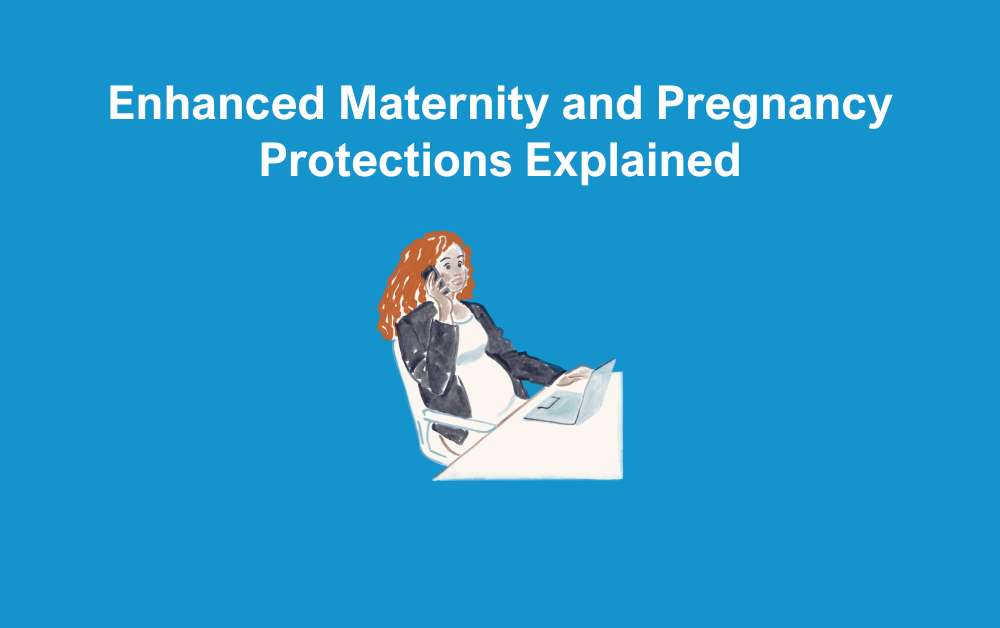The UK government has taken another step forward in strengthening workplace rights for parents and expectant mothers. Once passed, Employees who are pregnant, on maternity leave, or within six months of returning to work will be given further protections from dismissal. Enhanced protections were granted in April 2024 to protect this group from dismissal. These proposed updates to the law will protect these employees even further.
In this article, we will look closer at the enhanced maternity and pregnancy protections, and how to plan ahead.
What is the current policy/legal framework?
Pregnant women and new mothers have strengthened protections against redundancy dismissals. These apply during pregnancy, maternity leave, and the return-to-work period. Employees in this category are given priority for suitable alternative roles, ahead of other staff at risk of redundancy. That said, redundancy remains one of the five potentially fair reasons for dismissal.
Additional protections prevent dismissal because of pregnancy, maternity leave, pregnancy-related illness, or related benefits. Any such dismissal is automatically unfair, and it is unlawful to subject the employee to detrimental treatment on these grounds.
Despite these measures, many mothers still experience discrimination, less favourable treatment, and ongoing risks to their job security.
What are the new protections?
The Government plan to enhance current protections by making it against the law to dismiss pregnant employees and women on maternity leave, or in the six months after they return back to work. There will be specific circumstances where this won’t apply. However, the Government are still to disclose this information. The main purpose of this enhancement is to tackle pregnancy and maternity discrimination and to stop women feeling like they have to leave the workplace.
An Equality and Human Rights Commission (EHRC) report in 2016 revealed that 11% of mothers in Britain may be forced out of their jobs each year. This happens through dismissal, compulsory redundancy, or because poor treatment during pregnancy, maternity leave, or upon returning to work leaves them feeling they have no choice but to resign. In real terms, this amounts to around 54,000 women annually.
The same EHRC report also found that approximately 1% of mothers are directly dismissed following pregnancy. According to the Government’s impact assessment, this represents around 4,100 women every year. The enhanced maternity and pregnancy protections will support these women.
How will this affect employers?
The changes brought in under the Employment Rights Bill mean that employers now need to be more cautious and considered when handling dismissals involving employees who are pregnant, on maternity leave, or have returned to work within the last six months. Failure to follow the law correctly could lead to claims of unfair dismissal, discrimination, and reputational damage.
Managing dismissals fairly
With enhanced protections in place, dismissing an employee in these circumstances will be much harder to justify. Employers must demonstrate that any dismissal is for a fair reason, such as misconduct or genuine redundancy, and that they have followed a thorough and transparent process. Extra care will be needed to show that the decision is not linked to pregnancy or maternity leave in any way. This includes documenting all decision-making steps and ensuring managers are trained to handle such cases appropriately.
Updating HR policies and procedures
Employers should review their existing HR policies, contracts, and staff handbooks to make sure they reflect the updated protections. Recruitment, absence management, and redundancy policies may all need updating. It is also a good idea to provide refresher training to HR teams and line managers so they understand their obligations and the risks of non-compliance. Proactive updates now will reduce the likelihood of costly disputes later.
Preparing for the changes: steps employers should take
For employers, these enhanced protections are not just a legal requirement but an opportunity to demonstrate best practice in supporting staff during pregnancy and parenthood. To prepare effectively, businesses should:
-
Review policies and contracts – make sure disciplinary and dismissal policies are updated to reflect the new protections.
-
Train managers – line managers need to understand their responsibilities, particularly around fair treatment, communication, and handling absence.
-
Document decisions carefully – where a dismissal is considered, a clear paper trail of reasoning, alternatives, and compliance with the law will be essential.
-
Strengthen support practices – consider flexible working requests, return-to-work programmes, and open conversations about employees’ needs.
Final thoughts
The Employment Rights Bill marks a significant step in safeguarding pregnant employees and new parents from unfair dismissal. While the changes may feel like an additional compliance burden, they also encourage fairer and more supportive workplaces. Employers who act early to update policies and train managers will not only stay compliant but also build trust with their teams. Ultimately, the strengthened protections benefit everyone – providing security for employees while helping organisations retain skilled and committed staff.
Contact Us
If you have any further questions on Enhanced Maternity and Pregnancy Protections, our HR Consultants are here to help. Get in touch with us today.







